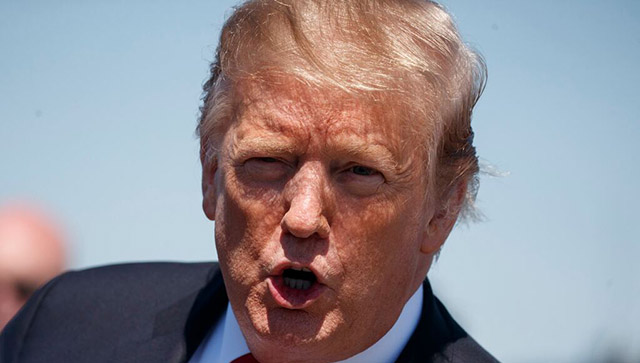As tensions rise and concerns deepen in Europe, the focus turns sharply to the remarks made by former US president Donald Trump regarding NATO members’ financial contributions to the alliance. In a recent speech, Trump sent shockwaves across European NATO members, triggering a spectrum of reactions and prompting crucial discussions on the continent’s security landscape.
Pay up: Trump to NATO Trump’s assertion that the US would not automatically defend NATO allies who fail to meet their financial obligations has left European leaders grappling with newfound uncertainties. With 29 of NATO’s 31 members situated in Europe, the implications of Trump’s stance reverberate profoundly across the continent. “One of the presidents of a big country, he stood up, said, ‘Well, sir, if we don’t pay and we’re attacked by Russia, will you protect us?’ I said, ‘You didn’t pay? You’re delinquent?’ He said, ‘Yes, let’s say that happened.’ (AND TRUMP SAYS HE RESPONDED:) ‘No, I would not protect you. In fact, I would encourage them to do whatever the hell they want. You got to pay. You got to pay your bills’,” said Trump. A worried Europe The crux of Trump’s message, emphasizing the necessity for NATO members to fulfill their financial commitments has sparked varied responses in Europe. While some view it as a necessary wake-up call, urging increased cooperation and defence spending, others express indignation, perceiving it as a betrayal of the longstanding principles of collective defence within NATO. European leaders, including Estonian Prime Minister Kaja Kallas and Polish Prime Minister Donald Tusk, have acknowledged the need for greater European self-reliance in defence matters. They see Trump’s remarks as a sobering reminder of the imperative for Europe to bolster its defence capabilities independently while maintaining cooperative ties with the United States. “So I think it still is the plea for everybody to do more, and I think what the presidential candidate in America says is also something to maybe wake up the allies who haven’t done that much, so hopefully we all do more and collectively we are stronger together,” said Estonian Prime Minister Kallas. “These words from (former US president) Donald Trump should act as a cold shower for all those who constantly disregard this increasingly real threat Europe is facing. We have to stand on our own feet of course, still counting on full cooperation with the United States. But Europe must do more to ensure its security.” Reacting to Trump’s words, Polish Prime Minister Donald Tusk said: “Despite Trump’s assertion, European leaders emphasize the enduring importance of transatlantic cooperation while also underscoring the urgency for Europe to enhance its defence posture. The sentiment echoes across various European capitals, with leaders emphasizing the imperative for collective action and solidarity in the face of evolving security challenges.” Danish Prime Minister Mette Frederiksen felt it was time for Europe to be stronger on its own. “No matter what will happen in the US this year, I think the conclusion has to be written already now that Europe needs to be stronger and we need to be able to do more on our own," the Danish prime minister said. Polish Foreign Minister Radoslaw Sikorski sought to remind Trump as to how European nations helped US when it was in a crisis itself. “Article 5 of the Washington Treaty was used for the first time after a terrorist attack on the United States, after September 11. And at that time Poland sent army brigades to Afghanistan for decades, and we didn’t send the bills for that to Washington. Alliances also strengthen the United States,” said Sikorski. Poland, France, and Germany have pledged to strengthen Europe’s defence capabilities in response to growing apprehensions over Russian assertiveness and concerns raised by Trump’s remarks. Initiatives such as increasing defence spending, deepening mutual defence ties and revitalising regional alliances reflect a concerted effort among European nations to fortify their security architecture. The repercussions of Trump’s statements extend beyond mere rhetoric, prompting concrete measures among European nations to mitigate reliance on American assistance and enhance intra-European defence cooperation. As Europe embarks on a path towards greater self-reliance and solidarity, the ramifications of Trump’s tenure continue to reverberate, reshaping the dynamics of transatlantic relations and NATO’s role in ensuring collective security. In the wake of Trump’s remarks, Europe stands at a critical juncture, poised to recalibrate its defence priorities and assert greater autonomy in safeguarding its interests. While Trump’s words have elicited both consternation and resolve among European leaders, they have catalyzed a renewed sense of purpose in confronting the security challenges of the 21st century, signalling a pivotal moment in the evolution of European defence policy. Views expressed in the above piece are personal and solely that of the author. They do not necessarily reflect Firstpost’s views. Read all the Latest News , Trending News , Cricket News , Bollywood News , India News and Entertainment News here. Follow us on Facebook, Twitter and Instagram.


)

)
)
)
)
)
)
)
)



